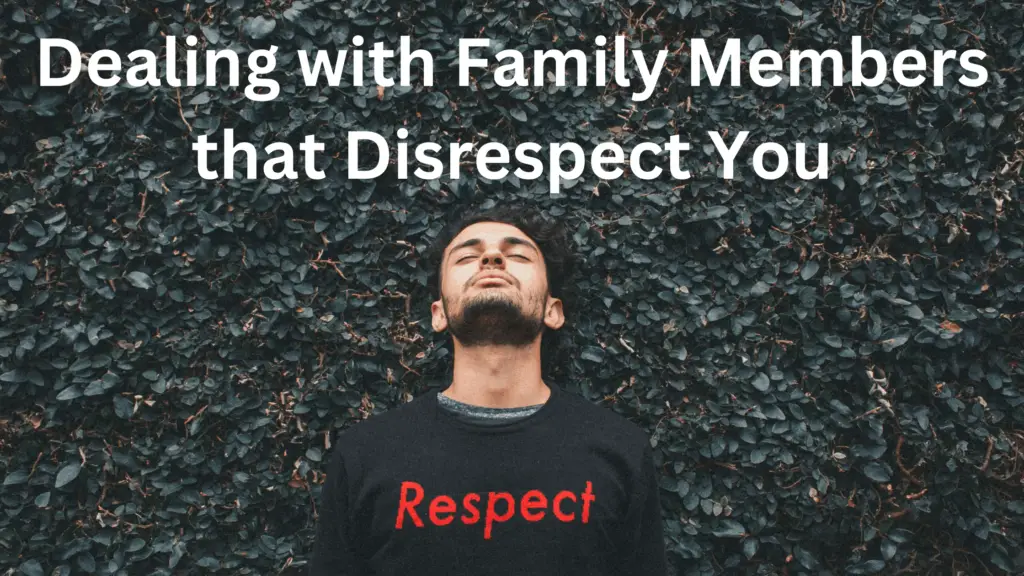Family, they say, is where life begins and love never ends. But what happens when the love and respect you deserve seem to have taken a vacation? Dealing with family members who disrespect you can be incredibly challenging. This is especially when the hurt comes from those who are supposed to be your closest allies. So, how to deal with family members that disrespect you? What are some of the effective strategies to handle disrespectful behavior within your family, while preserving your own well-being and dignity?
How to Deal With Family Members That Disrespect You
Family relationships are the cornerstones of our lives, providing us with a sense of belonging, support, and love. But what does one have to do when he or she is disrespected? Well, below are some ways to navigate the situation.
Understanding Disrespectful Behavior
Recognizing Signs of Disrespect
Disrespect can manifest in various forms, from subtle jabs to outright verbal abuse. Pay attention to those moments when your feelings are ignored or opinions belittled. It could also come in the form of undermining your decisions or consistently devaluing your contributions.
Identifying Potential Causes of Disrespectful Behavior
Understanding the reasons behind disrespectful behavior is key to finding solutions. Sometimes, it stems from unresolved conflicts or misunderstandings. Other times, it’s linked to underlying power dynamics within the family. Taking a step back to assess the potential triggers can help you approach the situation more objectively.
So, try to understand why your family member is being disrespectful. Are they going through a difficult time? Are they feeling insecure? Once you understand the reason for their behavior, you may be able to find a way to address it.
Self-Reflection and Setting Boundaries
Assessing Your Emotional Responses
Before addressing the issue, take time to reflect on your own emotional responses. Are there particular triggers that set off intense emotions? Identifying these triggers will not only help you manage your reactions but also equip you with a clearer mindset to deal with the situation constructively.
Establishing Personal Boundaries
Defining your boundaries is crucial in any relationship, family included. Determine what behavior is absolutely unacceptable to you. Communicate these boundaries assertively yet respectfully. Remember, setting boundaries isn’t about building walls; it’s about creating a safe and respectful space for everyone involved.
Effective Communication Strategies
Choosing the Right Time and Place
When confronting disrespectful behavior, timing and setting play a pivotal role. Avoid heated conversations in public or during tense moments. Opt for one-on-one discussions whenever possible. This creates an environment where both parties can openly express themselves without the pressure of an audience.
Using “I” Statements
Yes, “I ” statements is an effective way on how to deal with family members that disrespect you. Communication is a two-way street, and “I” statements can pave the way for smoother dialogue. Instead of accusing or blaming, express your feelings using phrases like “I feel hurt when…” or “I believe that…”. This approach encourages understanding rather than defensiveness.
Active Listening
Listening isn’t just about hearing words; it’s about understanding emotions and perspectives. When your family member speaks, be present and genuinely attentive. Acknowledge their feelings, even if you disagree. This creates an atmosphere of respect and opens the door for meaningful conversation.
Stay Calm and Collected
When confronting disrespectful behavior, your emotions may be running high. However, try to stay calm and collected. Reacting with anger or defensiveness will only escalate the situation further. Take deep breaths and remind yourself of your goal – finding a resolution.
Be Direct and Assertive
Directness is key when addressing disrespectful behavior. Clearly express how their actions make you feel. For instance, say, “I feel disrespected when you make jokes about my weight.” This approach conveys your emotions while maintaining an assertive stance.
Read About: How to Deal With a Codependent Mother
Conflict Resolution and Problem Solving
Seeking Common Ground
Identify shared goals and values that can serve as a foundation for your conversations. Focusing on areas of agreement helps to build a bridge between differing opinions and brings you closer to a resolution.
Addressing Past Issues
Past conflicts and misunderstandings can cast a shadow on present interactions. Address these issues, acknowledge the pain they caused, and work towards forgiveness and resolution. This may require patience and understanding, but it’s a crucial step in mending strained relationships.
Involving a Neutral Third Party If Necessary
Sometimes, a neutral mediator can work wonders in facilitating communication. Consider family therapy or mediation sessions led by professionals who specialize in resolving family conflicts. Their expertise can guide both parties towards healthier interaction patterns.
Self-Care and Emotional Well-being
Managing Your Own Emotions
Dealing with family disrespect can be emotionally draining. Engage in stress-relief techniques such as deep breathing, meditation, or physical exercise. Pursue activities that bring you joy and a sense of accomplishment, helping to maintain your emotional balance.
Establishing a Support Network
Remember, you’re not alone in this journey. Seek advice and empathy from trusted friends, mentors, or support groups. Sharing your experiences with others who’ve faced similar challenges can provide insight, validation, and a sense of community.
Knowing When to Disengage
Not every battle is worth fighting, and not every conversation will lead to resolution. Recognize when further communication may be unproductive or damaging to your well-being. It’s okay to step back and prioritize your mental and emotional health. Focus on the positive relationships in your life. Surround yourself with people who love and respect you. This will help you to cope with the disrespect from your family member.
Conclusion
Dealing with family members who disrespect you is undoubtedly a tough road to travel. But armed with understanding, effective communication, and self-care, you can navigate these challenges while maintaining your own sense of self-worth and dignity. Change takes time, and the journey towards healthier family dynamics is a journey worth embarking upon. By setting boundaries, fostering open communication, and prioritizing your well-being, you can create a more respectful and harmonious environment within your family.







